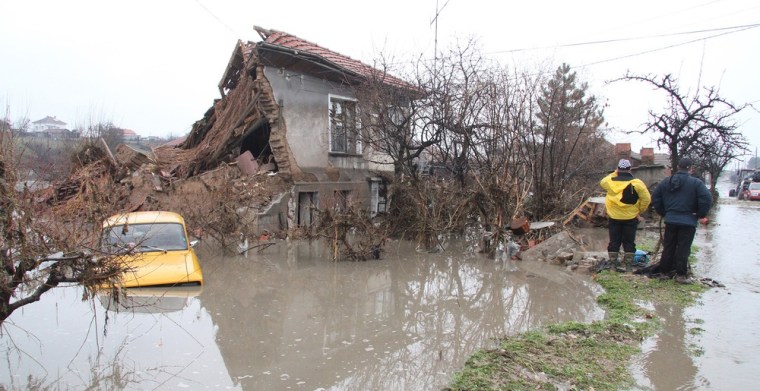Much of Europe is still covered in snow and ice, but some areas are already seeing deadly flooding amid concerns that it will get worse before it gets better.
Swollen rivers in Greece and Bulgaria burst their banks Tuesday, leaving dozens of homes underwater, as Bulgarian officials declared a day of mourning for eight people confirmed killed after a dam collapse nearly washed away their village.
Bulgaria's civil defense agency warned that two other, bigger dams were also on the brink of spilling over and residents were urged to prepare for an evacuation. Authorities have started a controlled release of water from the dams to prevent overflow.
Europeans across the continent have been battling more than a week of extreme weather. Thousands are still trapped by snow in remote, mountain villages in the Balkans. Hundreds — most of them homeless — have died after temperatures hit as low as minus 33 Fahrenheit; and authorities now face flooding caused by melting snow.
A day after the dam burst, the Bulgarian government declared a day of mourning, and streets in the village of Bisser were covered with sticky mud as people returned to their water-logged homes.
At least a dozen houses had collapsed, uprooted trees blocked roads and smashed cars sat abandoned along deserted streets. Veterinary officials were collecting the bodies of dead animals from streets still covered in snow.
Bisser Mayor Zlatka Valkova said she received a phone call about the dam and tried to get out of her office in time to alert people of the eight-foot-high torrent.
"I rushed out on the street, but then I saw the wave," she said. "It was terrible, it came with such speed that I couldn't do anything."
"It was terrifying," Iliyan Todorov told the Trud newspaper. "We were warned that the tsunami was coming only five minutes before the wave came ... We survived by a miracle".
The village's 800 residents have been provided with food, water and medicine while the recovery operations continue. District Gov. Irena Uzunova said eight people have been confirmed dead, and the whereabouts of an elderly couple remain unknown.
Bulgarian President Rosen Plevneliev and the European Union commissioner for humanitarian aid, Kristalina Georgieva, arrived Tuesday to assess the damage.
"The next two weeks will be very difficult and the melting snow could make the situation very complex," Georgieva told reporters in Bisser.
Georgieva voiced sympathy over the loss of lives and of property of people "who had not been wealthy even before the disaster."
Farther south, the heavy rain caused the Maritsa River to overflow its banks, leaving dozens of homes under water in the city of Svilengrad near the Greek border. Rescue crews helped transport nearly 100 residents to temporary shelters.
Electricity was also cut off to 300 towns and villages in Bulgaria, roads were closed and several border checkpoints with Romania and Turkey were shut, the Interior Ministry said.
The ministry said more heavy snowfall was expected.
The Geneva-based World Meteorological Organization said Tuesday that an incursion of cold polar air from northern Russia brought extremely low temperatures over large parts of Europe.
The cold air was fed with strong moisture from the central Mediterranean Sea, causing heavy snowfall over parts of southeastern Europe.
Developments elsewhere in Europe:
- Ukraine: 135 people were confirmed dead through Monday and forecasters said bitter temperatures, as low as minus 22 Fahrenheit, would continue until at least Feb. 15.
- Greece: Rescuers had to help five elderly people escape from their flooded homes after the river Evros burst its banks near the country's northeastern border with Bulgaria. Several elderly residents were also evacuated overnight from another three villages in the area. Greek civil protection authorities said a 40-year-old woman drowned in a flash flood on the eastern Aegean Sea island of Symi late Monday. Heavy snowfall was reported across northern Greece, hampering road traffic and causing some power cuts in remote areas.
- Serbia: Emergency officials said the army will use explosives to break up ice on the Danube and Ibar rivers to try to prevent flooding. A 30-year-old woman died when large pieces of ice and snow collapsed on her in a suburb of the capital, Belgrade.
- Poland: The big freeze killed another six people in the last 24 hours, the Interior Ministry said in a statement. Ministry spokeswoman Malgorzata Wozniak said Tuesday that three other people died of asphyxiation with carbon monoxide from heaters they were using to heat their homes.
- Lithuania: Officials said 23 people have died so far this year due to sub-freezing temperatures in the tiny Baltic republic of 3 million.
- Montenegro: The capital of Podgorica was hit by strong winds that blew off roofs from houses, pulled out trees and traffic signs, turned over garbage containers and left parts of the city without electricity.
- Croatia: In Split, on the Adriatic coast, authorities said the local hospital is overcrowded with people who sought help for injuries sustained in falls because of ice and snow. Split is unused to snow and usually has mild winters.
- Romania: Around 146 towns and villages were isolated with no road or train connections because of blizzards. Up to 174 villages had no electricity.
